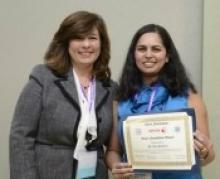
NORTHFIELD, Vt. – A way to turn stormwater runoff into drinking water will be investigated in one of two recently awarded research grants to the David Crawford School of Engineering at Norwich University.
Both grant projects are overseen by Assistant Professor of Civil Engineering Tara Kulkarni.
Kulkarni earned a pilot grant that funds her collaboration with a student research project led by senior civil engineering student Susan Limberg. Kulkarni, as the faculty adviser, wrote a proposal based on Limberg’s idea of developing pervious concrete filters to control stormwater runoff. One compelling component to their project is a filtration process aimed at transforming rainwater into drinkable water.
They received a Phase I, $14,957 grant from the P3: People, Prosperity and the Planet Student Design Competition for Sustainability, a national-level competition offered by the U.S. Environmental Protection Agency.
Limberg serves as a cadet first lieutenant, executive officer of Drill Company in the Norwich University Corps of Cadets and as president of the NU Society of Women Engineers. Working with Prof. Kulkarni as her advisor, Limberg will study the filtration component of the stormwater runoff project as part of her senior honors thesis. Norwich faculty who study economics and sociology are also supporting her research.
Meanwhile, Assistant Professor of Civil Engineering Kulkarni has received a $9,917 pilot project grant of her own via the University of Vermont’s National Science Foundation EPSCoR program.
The Experimental Program to Stimulate Competitive Research (EPSCoR) is designed to fulfill the National Science Foundation's (NSF) mandate to promote scientific progress nationwide.
Last month Kulkarni began work on her project, which aims to design a suitable model for Green Infrastructure/Low Impact Development (GI/LID) projects to manage stormwater in Vermont watersheds.
Her research is investigating stormwater issues across the Winooski River watershed with a special focus on Montpelier.
The research will involve undergraduate students at Norwich and engage two undergraduate classrooms in stormwater quality assessment and modeling related activities. In addition, K-12 students in four Vermont schools in Montpelier, Burlington, St. Johnsbury, and Williamstown as well as local area Girl Scouts groups will participate in water resource management and green infrastructure related activities as part of a STEM (Science, Technology, Engineering, Math) educational outreach effort.
